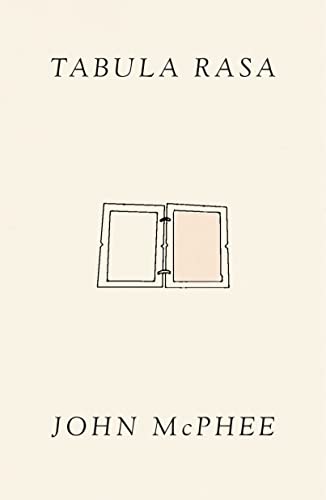Tabula Rasa: Volume 1

“McPhee is a writer with a generous heart and sharp self-deprecatory sense of humor. Tabula Rasa is no blank slate. It is a story that tells the reader much about McPhee the writer, the man, and the teacher.”
John McPhee’s new book, Tabula Rasa, brings his personal bookshelf in any public library to nearly three dozen works of nonfiction, many of them the finest produced in America during the 20th and 21st centuries. His new collection, 50 short pieces about stories he considered but never wrote, tells the tale of both an enviable writing life and an inspired career as a part-time teacher.
McPhee, who has lived his entire nine decades in Princeton, New Jersey, has been a staff writer for The New Yorker for 60 of those years and a writing instructor for undergraduates at Princeton University for 50. Even a very abbreviated list of the alumni of McPhee’s courses sound like a writerly Hit Parade—David Remnick, the current editor of The New Yorker; Eric Schlosser, author of the best-selling Fast Food Nation; Jennifer Weiner, also a bestseller with novel In Her Shoes; and Richard Preston, author of The Hot Zone: A Terrifying True Story.
In the final essay in Tabula Rasa, “Deep Insight,” McPhee offers a perspective on the writer-teacher’s life. It is fairly common to hear university creative writing faculty moan and complain about how their teaching duties shrink their writing world considerably. Not so with McPhee. As he explains, “In teaching semesters, I wrote nothing of my own. It was like crop rotation. I was fallow. And I was doing something complementary with my own writing—talking about writing with young writers about their writing. I had no way to measure this, but across the years I had the distinct feeling that the refreshment of the teaching months resulted in more writing done by me than I would have done without the teaching.” His oeuvre is the pudding that makes his point.
In the essay “Zoom Laude,” McPhee recounts some of his 2020 experience teaching 16 sophomores as Covid-19 changed the world. His students’ stories are as inventive as those created by their teacher during more than a half-century with The New Yorker. One student got himself admitted to Barnum & Bailey Clown College in Sarasota, Florida, so that he could write about it. He came back to Princeton University instead of transferring permanently. McPhee told him “ever after that he passed up a great opportunity, but he opted not to transfer.” Other students wrote about the toilet paper violence in supermarkets, the phenomenon of “fiancé fever” among the Marines at Quantico, or unicycling across the Brooklyn Bridge and north into Manhattan and up under the George Washington Bridge.
For McPhee, Princeton is like Twain’s Hannibal, the locus of his imagination. And some of the tales in Tabula Rasa have a Tom Sawyer-like feel to them, narrating the sweet and funny adventures of a pre-adolescent boy who knew every back alley and open window on Princeton campus because his father was the team doctor for the football, basketball, and baseball teams. That is not the only echo of Twain in Tabula Rasa. Taking his cue from Mark Twain, who entered his massive three-volume autobiography as an “old man’s project” to keep him from expiring. It didn’t, of course.
Nor did it make octogenarian Thornton Wilder immortal as he engaged in the cataloguing of the 431 extant plays of Lope de Vega. With a little help from a friend, McPhee might have figured out how to make his project an infinite one. He explains: “After six or seven months, however, I felt a creeping dilemma, and I confided it one day on a bike ride with Joel Achenbach, author of books on science and history, a reporter from The Washington Post, and a student from my writing class in 1982. Doing such a project as this one, I whined, begets a desire to publish what you write, and publication defeats the ongoing project, the purpose of which is to keep the old writer alive by never coming to an end. Joel said, “Call it Volume One.’” And that’s exactly what McPhee did, giving every reader a hope for volumes two, three, and on.
There are simply too many compelling and witty pieces in Volume 1 for a reviewer to recount. McPhee chooses his words with the care Proust did, only McPhee is always far more informative and funnier than Proust. McPhee is a writer who seems capable of making any subject fascinating—be it a book on oranges or a quartet on geology. In this collection, he takes his readers to Extremadura in Spain, to the Leaning Tower of Pisa, from Gibraltar to the northernmost part of Maine. And partly because his home base has always been Princeton, his sentences cross paths with and array of local characters: Albert Einstein, Pete Carril, J. Robert Oppenheimer, Arnold Toynbee, and Robert Benchley, among them. Then there are the guests who end up on the Princeton campus. This allows him, for instance, to offer a two-page profile of Edward Abbey, the long and lanky, dry and wry author of Desert Solitaire and the man whose friends set a rock by his grave with the perfect Abbey-esque two-line: “No comment.”
It is well known that McPhee has never had an author’s photograph attached to any of his books, as if he wants to make it clear that the story is the only thing the reader should be concerned with. But clearly the myth of the bearded hermit writer and the dry reporter are as false as the flat-earth theory. McPhee is a writer with a generous heart and sharp self-deprecatory sense of humor. Tabula Rasa is no blank slate. It is a story that tells the reader much about McPhee the writer, the man, and the teacher.